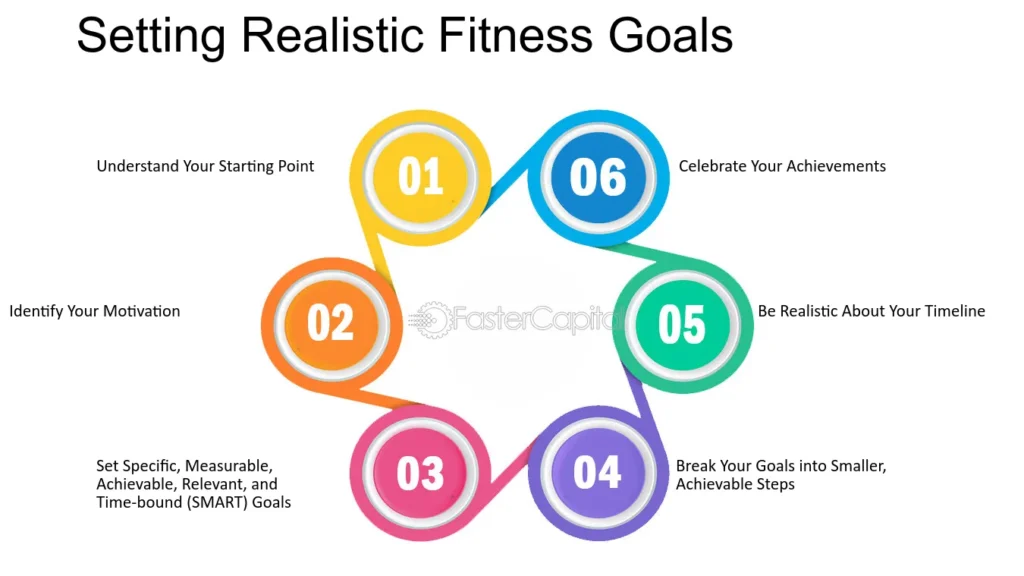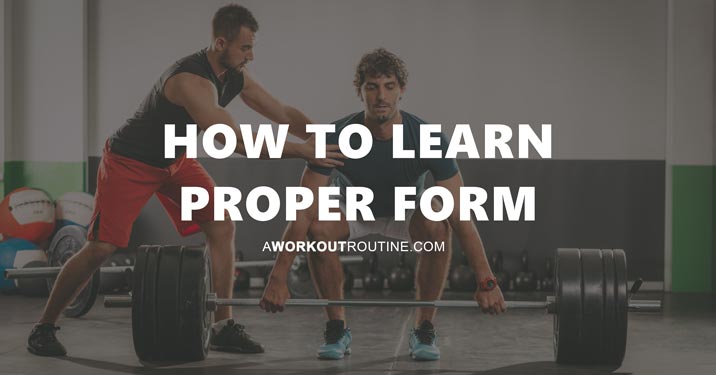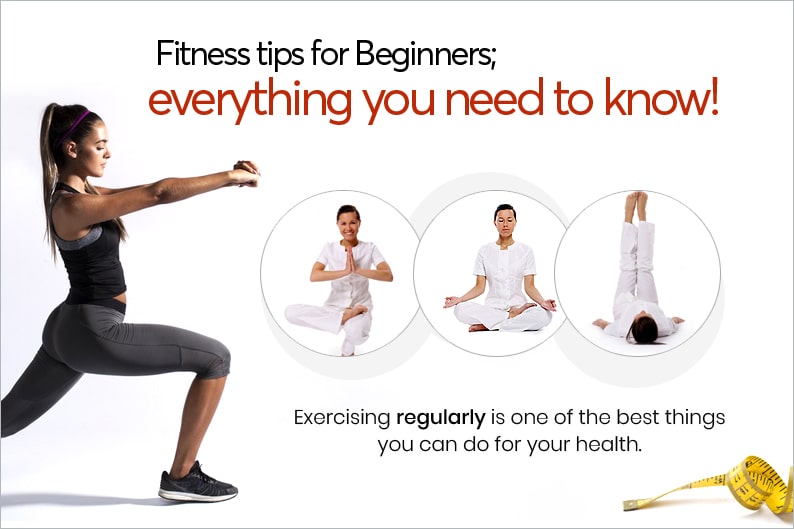This article provides beginner-friendly fitness tips, emphasizing realistic goals, gradual progress, proper form, balanced routines, rest, nutrition, and consistency for long-term health.
This guide will provide you with simple, effective, and actionable fitness tips to help you build a strong foundation for a healthy and active lifestyle. Whether you’re aiming to lose weight, build muscle, improve endurance, or just feel better in your own skin, these fitness tips for beginners will get you started on the right track.
Set Realistic Goals:

Before you jump into any workout routine, it’s crucial to define what you want to achieve. Ask yourself why you’re starting your fitness journey. Is it to lose weight? Build muscle? Improve your overall health?
Start with specific, measurable, achievable, relevant, and time-bound (SMART) goals. For example, rather than saying, “I want to get fit,” try setting a goal like, “I want to walk for 30 minutes, five times a week for the next two months.” This provides clarity and makes it easier to track your progress.
Why This Matters:
Setting realistic goals keeps you motivated, focused, and accountable. It’s important to aim for something tangible, so you can celebrate milestones along the way.
Start Slowly and Gradually Increase Intensity:
One of the most common mistakes beginners make is diving headfirst into an intense workout routine. Doing too much too soon can lead to burnout, injury, or frustration. Instead, start slow and progressively increase your intensity over time.
- Begin with low-impact exercises like walking, cycling, or swimming.
- Incorporate bodyweight exercises like squats, push-ups, or lunges to build strength.
- Gradually add weight or increase the duration and frequency of your workouts.
Also Read: Should I Let Them Heal Doing Exercise – A Complete Guide!
Why This Matters:
Building endurance and strength takes time. By easing into fitness, you’ll prevent injuries, maintain consistency, and allow your body to adapt to new demands.
Learn Proper Form and Technique:

Proper form is essential to prevent injury and get the most out of each exercise. Whether you’re lifting weights, doing bodyweight exercises, or engaging in cardio, learning the correct form and technique will help you stay safe and maximize your results.
- If possible, work with a trainer or watch tutorials to ensure you’re performing movements correctly.
- Pay attention to your posture, core engagement, and joint alignment during each exercise.
Why This Matters:
Good form reduces the risk of injury and ensures that you’re targeting the right muscles. It also makes your workouts more efficient.
Incorporate a Balanced Workout Routine:
A well-rounded fitness routine should include a combination of cardio, strength training, and flexibility exercises. Each type of exercise offers unique benefits:
- Cardio (e.g., running, cycling, swimming) improves heart health, burns calories, and boosts endurance.
- Strength training (e.g., lifting weights, resistance bands) builds muscle, strengthens bones, and boosts metabolism.
- Flexibility and mobility exercises (e.g., yoga, stretching) enhance your range of motion, prevent stiffness, and improve balance.
Try to mix up your workouts to keep things interesting and challenge different muscle groups.
Also Read: Is It Effective To Go To The Gym Every Day – Is It Effective or Risky!
Why This Matters:
Variety prevents boredom, keeps your body challenged, and ensures you develop balanced fitness. It also reduces the risk of overuse injuries from repetitive motions.
Rest and Recovery Are Crucial:

Beginners often underestimate the importance of rest and recovery. It’s during your rest days that your body repairs and strengthens itself, making recovery a key part of progress. Make sure to:
- Take at least one or two rest days per week.
- Get enough sleep (7-9 hours per night) to support muscle recovery.
- Incorporate active recovery activities like walking, stretching, or yoga to stay mobile without stressing your body.
Why This Matters:
Overworking your body without adequate rest can lead to injury, burnout, and setbacks. Rest days allow your muscles to rebuild, making you stronger and more resilient for future workouts.
Focus on Nutrition:
Fitness isn’t just about what you do in the gym—it’s also about what you put into your body. Eating a balanced diet provides the fuel your body needs to perform and recover. Focus on:
- Protein to support muscle repair and growth (e.g., lean meats, eggs, legumes, and tofu).
- Complex carbohydrates for energy (e.g., whole grains, fruits, and vegetables).
- Healthy fats to support overall health (e.g., avocados, nuts, and olive oil).
- Hydration—drink plenty of water, especially before, during, and after exercise.
Consider working with a nutritionist or dietitian to tailor a diet plan that aligns with your fitness goals.
Also Read: How Often Should You Exercise – A Comprehensive Guide!
Why This Matters:
Proper nutrition fuels your workouts, aids recovery, and supports overall health and well-being. Without the right balance of nutrients, your progress may be slower, and your energy levels may suffer.
Listen to Your Body:

Your body is the best guide for determining how hard to push yourself. Pay attention to how you feel during and after workouts. If something feels wrong or painful, stop and assess the situation. It’s normal to feel some discomfort as you challenge your body, but sharp pain or extreme fatigue could be signs of injury or overtraining.
- Modify exercises when needed to avoid strain.
- Take breaks when necessary.
- Seek professional advice if you experience persistent discomfort.
Why This Matters:
Listening to your body helps you avoid injury, maintain motivation, and ensure long-term success. Respect your limits, especially as a beginner, and recognize that progress takes time.
Find a Workout You Enjoy:
One of the best ways to stay consistent with your fitness routine is to find activities that you genuinely enjoy. If you hate running, don’t force yourself to run every day. Instead, explore different forms of exercise until you find something you look forward to, whether it’s dancing, hiking, weightlifting, or group classes like Zumba or spinning.
Also Read: https://fitnesssmartly.com/different-types-of-workouts/
Why This Matters:
When you enjoy your workouts, you’re more likely to stick with them. Fitness should be fun, not a chore, so experiment with different activities to discover what excites you.
Track Your Progress:

Keeping track of your workouts and progress can be incredibly motivating. It allows you to see how far you’ve come and adjust your routine as needed. You can track:
- Workouts (e.g., duration, type, intensity).
- Body measurements (e.g., weight, waist circumference, muscle gain).
- Fitness milestones (e.g., running a mile without stopping, lifting heavier weights).
Use a fitness app, journal, or calendar to document your progress and celebrate your wins along the way.
Why This Matters:
Tracking progress helps you stay focused, motivated, and accountable. It also allows you to adjust your goals and strategies as you get fitter and stronger.
Be Patient and Consistent:
Results won’t happen overnight. Fitness is a long-term commitment, and the key to success is consistency. Stay patient with the process and trust that with regular effort, you will see improvements in your strength, endurance, and overall health.
- Focus on small, sustainable changes rather than drastic overhauls.
- Celebrate every milestone, no matter how small.
Also Read: Do Local Gyms Teach Yoga Classes – Classes, Benefits, and More!
Why This Matters:
Fitness is a journey, not a destination. By staying patient and consistent, you’ll build habits that will last a lifetime and keep you on the path to long-term health and wellness.
FAQ’s
1. What is the first step to starting a fitness journey?
Set realistic and specific goals, such as using the SMART method to define what you want to achieve.
2. How should beginners approach exercise intensity?
Start slowly with low-impact exercises and progressively increase the intensity over time to avoid injury.
3. Why is proper form important in fitness?
proper form prevents injuries and ensures that exercises are effective by targeting the right muscles.
4. How often should beginners rest during their fitness routine?
Beginners should take 1-2 rest days per week to allow muscles to recover and grow.
5. What role does nutrition play in fitness for beginners?
A balanced diet fuels workouts, supports recovery, and aids overall health, with a focus on protein, complex carbs, and hydration.
Conclusion
In summary, this guide provides essential fitness tips for beginners, focusing on setting realistic goals, gradually increasing intensity, and learning proper form. It emphasizes the importance of a balanced workout routine, adequate rest, and proper nutrition for long-term success. Consistency, patience, and finding enjoyable activities are key to building sustainable fitness habits.